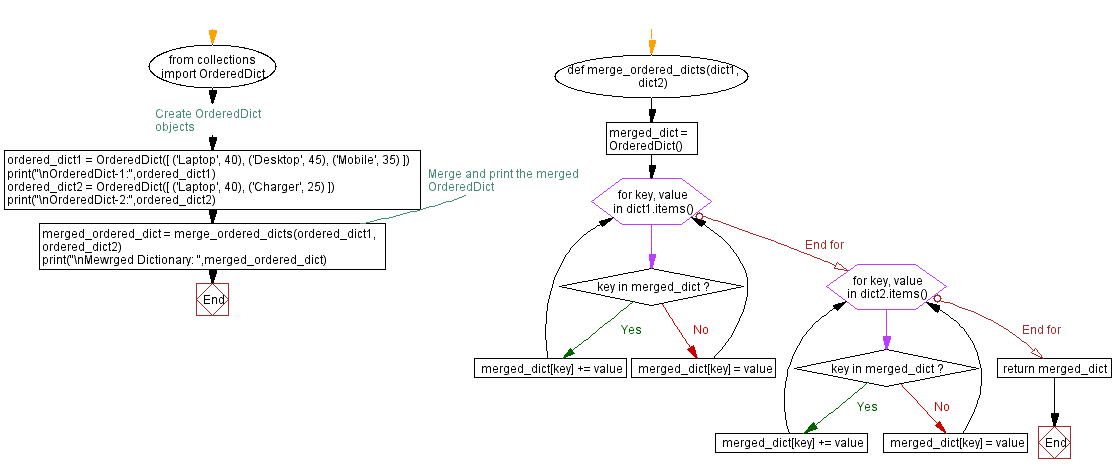Python merging OrderedDicts with summed values
7. Merge OrderedDicts
Write a Python function that merges two OrderedDict objects. If there are duplicate keys, sum their values. Print the merged OrderedDict.
OrderedDict - 1
'Laptop': 40
'Desktop': 45
'Mobile': 35
OrderedDict - 2
'Laptop': 40
'Charger': 25
Sample Solution:
Code:
from collections import OrderedDict
def merge_ordered_dicts(dict1, dict2):
merged_dict = OrderedDict()
for key, value in dict1.items():
if key in merged_dict:
merged_dict[key] += value
else:
merged_dict[key] = value
for key, value in dict2.items():
if key in merged_dict:
merged_dict[key] += value
else:
merged_dict[key] = value
return merged_dict
# Create OrderedDict objects
ordered_dict1 = OrderedDict([
('Laptop', 40),
('Desktop', 45),
('Mobile', 35)
])
print("\nOrderedDict-1:",ordered_dict1)
ordered_dict2 = OrderedDict([
('Laptop', 40),
('Charger', 25)
])
print("\nOrderedDict-2:",ordered_dict2)
# Merge and print the merged OrderedDict
merged_ordered_dict = merge_ordered_dicts(ordered_dict1, ordered_dict2)
print("\nMerged Dictionary: ",merged_ordered_dict)
Output:
OrderedDict-1: OrderedDict([('Laptop', 40), ('Desktop', 45), ('Mobile', 35)])
OrderedDict-2: OrderedDict([('Laptop', 40), ('Charger', 25)])
Merged Dictionary: OrderedDict([('Laptop', 80), ('Desktop', 45), ('Mobile', 35), ('Charger', 25)])
In the exercise above, the "merge_ordered_dicts()" function takes two OrderedDict objects as input ('ordered_dict1', 'ordered_dict2') and returns a new OrderedDict containing the merged and summed key-value pairs. The function iterates through both input dictionaries. The value of an existing key in the merged dictionary is added to the existing value if it already exists. Otherwise, it adds the key-value pair to the merged dictionary.
Flowchart:

For more Practice: Solve these Related Problems:
- Write a Python function that merges two OrderedDicts, summing the values for duplicate keys, and then prints the resulting OrderedDict.
- Write a Python program to combine two OrderedDict objects and handle overlapping keys by choosing the maximum value for each duplicate key.
- Write a Python script to merge multiple OrderedDicts into one while preserving insertion order and summing duplicate keys.
- Write a Python program to take two OrderedDicts, merge them by concatenating their values for duplicate keys, and then print the merged dictionary.
Python Code Editor :
Previous: Python OrderedDict Key-Value removal.
Next: Python Removing key-Value pair from OrderedDict.
What is the difficulty level of this exercise?
Test your Programming skills with w3resource's quiz.
